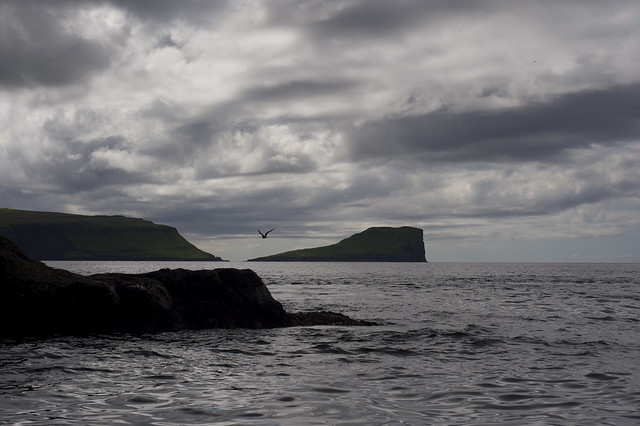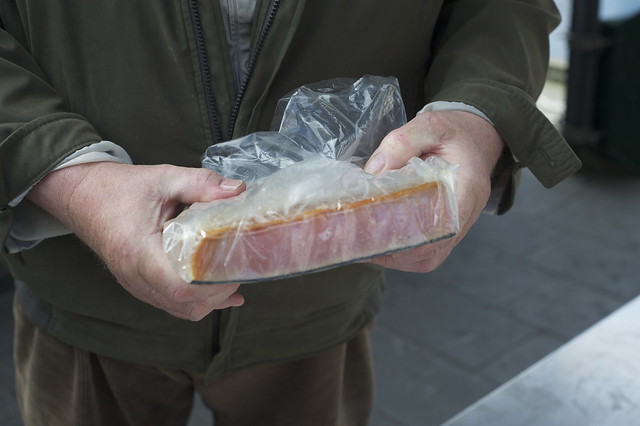To be honest I didn’t intend to write about it – and in all sincerity (and a bit of naiveté?) I really didn’t think the topic actually would come up – but I was wrong. The issue of the long standing Faroese tradition of hunting pilot whales was something a number of Faroe Islanders wanted to discuss with me. Now back home and thinking about my time there, any account of my trip without mention of this part of Faroes Islands life would be remiss. Please note that in this post I’m only going to tell you what I witnessed and experienced for myself and what people told me while I was there. If this issue is an important one for you, there are much better sources of information about the Faroese tradition of hunting pilot whales.
There was the kind and elderly woman whom I asked for directions and ended up giving a lift into Torshavn. When I told her I was a writer she asked if I was there to write about whale hunting. To my negative response she said, “Oh good. Welcome!” There was the two-person North American crew on the islands to film a documentary about hunting and eating whale for Vice Magazine. Another out-of-towner, Pamela Anderson (yes, the Pamela Anderson of Baywatch fame) was also there, with her animal rights activist hat on. An interesting and unexpected celebrity siting, I saw her in the lobby of my hotel one morning.
There were others – all eager to talk about this contentious issue. And with respect to the locals who mentioned it to me, they were keen to let me know how proud they were of this significant aspect of Faroese heritage … that it’s the most democratic distribution of food ever to exist … that they don’t actually round up the animals as much as take advantage of situations when the whales happen into particular coves … that they only kill until they reach a certain limit …
Personally, I am deeply ambivalent about the subject. Indeed, images of the cull are bloody and horrific. Whales are beautiful, wild, intelligent creatures. It’s the 21st century, and there are all sorts of other things the Faroese could eat and different ways they could feed themselves. But as I understand it, the cull is as humane as, say, a deer hunt or slaughter of a domestic animal. And I wonder how unhealthy Faroese eating habits would be – and how big of a carbon footprint would be made – if the nation’s 50,000 some odd citizens were denied access to this traditional source of protein.
Perhaps shared with the most enthusiasm by local proponents of the hunt was the assertion that whale meat is extremely nutritious and especially tasty … and that it’s a key ingredient to what a few people described as the “ultimate burger”. I was presented with the chance to try an ultimate burger while in the Faroes – and I did. It was given to me at a privately hosted party – not sold in a restaurant, shop or any sort of commercial enterprise.
A so called ultimate burger consists of a slice of dried whale meat (with a flavour like a very iron-tasting salami), a slice of blubber (like a somewhat briny lardo), a piece of dried fish, and a chunk of boiled potato stacked together and to be eaten in one or two big mouthfuls. My own concept of an ultimate burger would have vastly different to be sure, but I could understand with my first bite how someone could love the taste of whale. Everybody around me was having a blast at this party and eating ultimate burgers seemed a key component of the celebration. I can’t say I’m necessarily proud of my choice to eat it or that it was particularly enjoyable for me, but given the unexpected opportunity I’m glad to have given it a try.
The burger analogy got to me though. Was this an admission of human gluttony and the epitome of carnal indulgence? Or was it a wry comment about consumerism and how Faroe Islanders are (however imperfectly) removed to a large extent from globalised, profits-driven corporate supply chains?
I’d like to end this post saying that if you’re against hunting pilot whales, I don’t think you should let that keep you away from the Faroes. First of all, you can go there without encountering anything to do with the hunt – you definitely won’t see whale products in any restaurants and shops. The occurrence itself is rare and usually in remote locations. But if you’re a wide eyed traveller like me and end up scratching just below the surface you will be made aware of it. In my opinion, the best way to affect change is to engage with those who see things different from you. Right or wrong, the locals I spoke to were open to discourse and extremely civil about the topic. Most of all they were keen to hear my take on the issue and learn about the world’s perception of life in this far flung North Atlantic archipelago.
Keep an eye out for more posts in my Faroes and Away miniseries.























I really really want to visit and I agree that it shouldn’t put anyone off, but it does make me feel very sad about it I a lot of views towards hunting, animals & everything that I won’t drone on about, but people aren’t very worldly conscious STILL
I a lot of views towards hunting, animals & everything that I won’t drone on about, but people aren’t very worldly conscious STILL  xx
xx
Pingback: Faroes and Away: My New Happy Place
Pingback: Good Stuff - tikichris